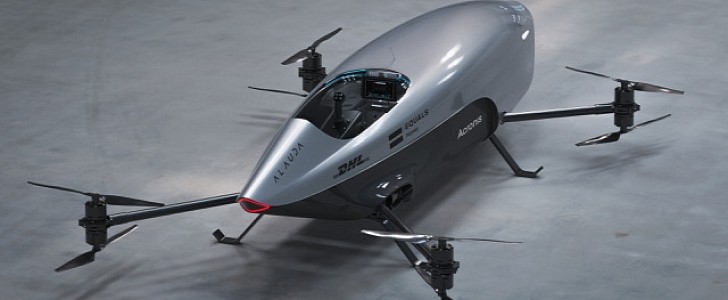We’re still a long way from seeing a flying car used for commercial or private purposes, but the flying race car of tomorrow is already here. Alauda has revealed the Airspeeder Mk3, dubbed the world’s first flying electric race car.
Alauda is just one of the companies currently working on a flying car. Like most other flying car projects out there, here, too, the moniker is somewhat of a misnomer: we’re still talking about an oversize drone or eVTOL (electric vertical takeoff and landing aircraft). This one will be used in the upcoming Airspeeder races that will debut sometime this year in Australia.
If the idea of having unmanned eVTOLs race each other seems silly, it’s not: the race itself will serve as a test for future technologies. Alauda hopes to make the Airspeeder flying car manned by the 2022 races, once the technologies used in the current model are tested on the track.
“The unveiling of the world’s first full-sized electric flying racing car is a landmark moment in the dawn of a new mobility revolution,” the company says in a statement.
“It is competition that drives progress and our racing series is hastening the arrival of technology that will transform clean-air passenger transport, logistics and even advanced air mobility for medical applications,” Alauda adds.
The Airspeeder racing series will be the first event of this kind in the world. Several examples of Mk3 will be build, with input from engineers sourced from McLaren, Babcock Aviation, Boeing, Jaguar Land Rover, Rolls-Royce and Brabham. They will be remotely operated by an expert operator on the ground, flying at speeds in excess of 120 kph (74.5 mph).
Airspeeder Mk3 has a carbon fiber frame and fuselage, and LiDAR and Radar collision avoidance systems, creating a “virtual forcefield” around it to ensure close but safe racing, according to Alauda. The Mk4 is being developed with a full carbon fiber monocoque body.
The Airspeeder races will be announced in the following weeks, once the final pre-season tests are completed. Alauda will then start delivering the Mk3 to teams.
If the idea of having unmanned eVTOLs race each other seems silly, it’s not: the race itself will serve as a test for future technologies. Alauda hopes to make the Airspeeder flying car manned by the 2022 races, once the technologies used in the current model are tested on the track.
“The unveiling of the world’s first full-sized electric flying racing car is a landmark moment in the dawn of a new mobility revolution,” the company says in a statement.
“It is competition that drives progress and our racing series is hastening the arrival of technology that will transform clean-air passenger transport, logistics and even advanced air mobility for medical applications,” Alauda adds.
The Airspeeder racing series will be the first event of this kind in the world. Several examples of Mk3 will be build, with input from engineers sourced from McLaren, Babcock Aviation, Boeing, Jaguar Land Rover, Rolls-Royce and Brabham. They will be remotely operated by an expert operator on the ground, flying at speeds in excess of 120 kph (74.5 mph).
Airspeeder Mk3 has a carbon fiber frame and fuselage, and LiDAR and Radar collision avoidance systems, creating a “virtual forcefield” around it to ensure close but safe racing, according to Alauda. The Mk4 is being developed with a full carbon fiber monocoque body.
The Airspeeder races will be announced in the following weeks, once the final pre-season tests are completed. Alauda will then start delivering the Mk3 to teams.





